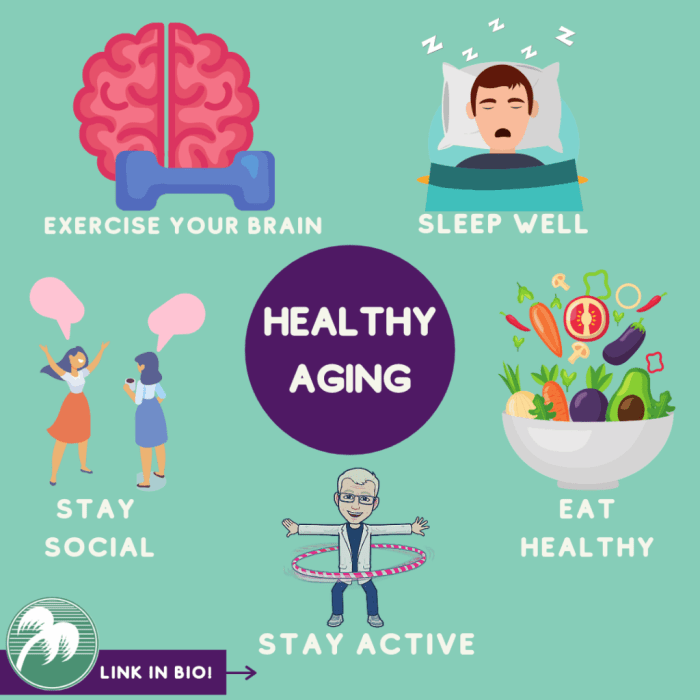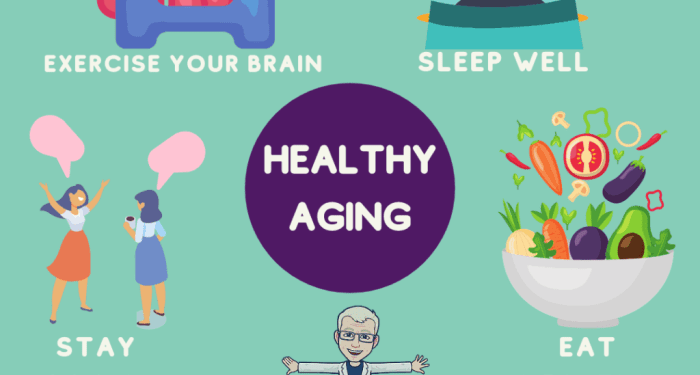Embark on a journey through evidence-based strategies for healthy aging with a focus on lifestyle changes that can make a significant difference. Science has illuminated the path to aging gracefully, and we're here to guide you through it.
Delve into the realm of nutrition, physical activity, sleep, stress management, social connections, and mental health as we uncover the secrets to healthy aging.
Introduction to Healthy Aging Tips
As we age, it becomes increasingly important to prioritize our health and well-being. Evidence-based strategies for healthy aging can help us maintain a high quality of life as we grow older. By incorporating lifestyle changes supported by science, we can proactively address the challenges that come with aging and promote overall wellness.
The Role of Nutrition in Healthy Aging
Nutrition plays a crucial role in healthy aging, as our dietary choices impact our physical and cognitive health. A balanced diet rich in nutrients such as antioxidants, omega-3 fatty acids, and fiber can help reduce the risk of chronic diseases and support optimal functioning of our bodies.
The Importance of Regular Physical Activity
Engaging in regular physical activity is key to healthy aging, as it helps maintain muscle mass, bone density, and cardiovascular health. Exercise also plays a vital role in cognitive function, mood regulation, and overall well-being as we age.
The Benefits of Social Connections
Building and maintaining strong social connections is essential for healthy aging. Social interactions can help reduce feelings of loneliness and isolation, improve mental health, and enhance overall quality of life. Engaging with others can also provide emotional support and a sense of belonging as we age.
Nutrition for Healthy Aging
Proper nutrition plays a crucial role in promoting healthy aging by providing essential nutrients to support overall well-being.Antioxidants are key components in reducing age-related damage by combating oxidative stress and inflammation in the body. These powerful compounds help protect cells from damage and support overall health as we age.
Key Nutrients for Healthy Aging
- Omega-3 fatty acids: Found in fatty fish, flaxseeds, and walnuts, omega-3s are essential for brain health and reducing inflammation.
- Vitamin D: Important for bone health and immune function, vitamin D can be obtained through sunlight exposure and fortified foods.
- Calcium: Vital for bone strength and muscle function, calcium-rich foods include dairy products, leafy greens, and fortified foods.
- Antioxidants: Found in fruits, vegetables, nuts, and seeds, antioxidants like vitamin C, vitamin E, and beta-carotene help protect cells from damage.
Dietary Patterns for Longevity
- Mediterranean Diet: Emphasizing fruits, vegetables, whole grains, fish, and healthy fats like olive oil, this diet is linked to reduced risk of chronic diseases and longer lifespan.
- Plant-Based Diet: Rich in fruits, vegetables, legumes, and nuts, a plant-based diet provides ample fiber, antioxidants, and nutrients to support healthy aging.
- DASH Diet: Designed to lower blood pressure, the DASH diet focuses on whole foods like fruits, vegetables, lean proteins, and low-fat dairy products, promoting heart health and overall well-being.
Physical Activity and Exercise
Regular exercise plays a crucial role in healthy aging by promoting physical and mental well-being. It can help maintain muscle mass, improve cardiovascular health, enhance flexibility, and even boost mood.
Benefits of Regular Exercise in the Aging Process
- Improved cardiovascular health and reduced risk of heart disease
- Enhanced muscle strength and flexibility, reducing the risk of falls
- Better weight management and metabolism
- Increased mood and overall sense of well-being
Examples of Age-Appropriate Exercises
- Walking or brisk walking for cardiovascular health
- Strength training with light weights or resistance bands to maintain muscle mass
- Yoga or Tai Chi for flexibility and balance
- Swimming or water aerobics for low-impact exercise
Impact of Physical Activity on Cognitive Function in Older Adults
Regular physical activity has been shown to have a positive impact on cognitive function in older adults. It can help improve memory, attention span, and overall cognitive abilities. Exercise increases blood flow to the brain, promotes the growth of new brain cells, and reduces the risk of cognitive decline associated with aging.
Sleep and Stress Management

Quality sleep and effective stress management are crucial components of healthy aging
Importance of Quality Sleep
Quality sleep is essential for healthy aging as it allows the body to repair and regenerate cells, consolidate memories, and regulate hormones. Lack of sleep can lead to cognitive decline, weakened immune function, and increased risk of chronic diseases.
- Aim for 7-9 hours of quality sleep each night.
- Create a relaxing bedtime routine to signal to your body that it's time to sleep.
- Avoid electronic devices and stimulating activities before bed.
- Ensure your sleep environment is dark, quiet, and comfortable.
Strategies for Managing Stress
Effective stress management is essential for healthy aging, as chronic stress can contribute to a variety of health issues, including heart disease, diabetes, and cognitive decline.
- Practice relaxation techniques such as deep breathing, meditation, or yoga.
- Engage in regular physical activity to reduce stress and improve mood.
- Maintain a healthy work-life balance and prioritize self-care activities.
- Seek support from friends, family, or a mental health professional if needed.
Connection between Stress, Sleep, and Aging
There is a close relationship between stress, sleep, and aging-related health issues. Chronic stress can disrupt sleep patterns, leading to poor sleep quality, while inadequate sleep can increase stress levels, creating a vicious cycle that can impact overall health and well-being.
It is important to address both stress and sleep issues to support healthy aging and reduce the risk of age-related health problems.
Social Connections and Mental Health
Maintaining strong social connections and good mental health are crucial components of healthy aging. Research has shown that staying socially engaged can help reduce feelings of loneliness and isolation, lower the risk of cognitive decline, and improve overall well-being in older adults.
Role of Social Interactions
- Regular social interactions can boost mood and reduce the risk of depression.
- Engaging with friends, family, and community groups can provide emotional support and a sense of belonging.
- Participating in social activities can stimulate the brain and help maintain cognitive function.
Tips for Staying Socially Engaged
- Join clubs or groups based on your interests, such as book clubs, fitness classes, or volunteer organizations.
- Stay connected with family and friends through regular phone calls, video chats, or in-person visits.
- Attend social events in your community, such as lectures, concerts, or art classes.
Impact of Mental Health on Overall Well-being
- Good mental health is essential for maintaining quality of life as we age.
- Untreated mental health issues can lead to increased risk of physical health problems.
- Seeking help from mental health professionals or support groups can improve mental well-being and overall health.
Final Thoughts
As we wrap up our exploration of healthy aging tips backed by science, remember that small changes today can lead to significant benefits tomorrow. Embrace these tips and witness the transformation in your journey towards graceful aging.
Expert Answers
What role does nutrition play in healthy aging?
Nutrition is crucial in promoting healthy aging by providing essential nutrients that support overall well-being and combat age-related issues.
How does physical activity impact the aging process?
Regular exercise not only helps maintain physical health but also plays a key role in preserving cognitive function as we age.
Why are social connections important for healthy aging?
Social interactions contribute to healthy aging by providing emotional support, reducing stress, and enhancing overall well-being in older adults.



